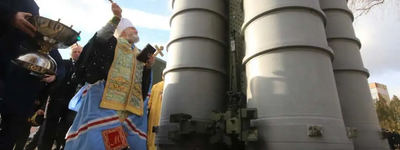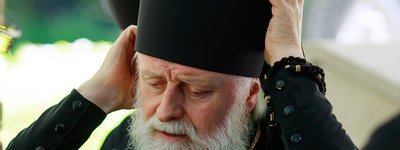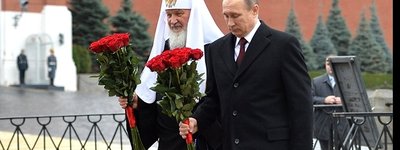Rain at the End of the Century
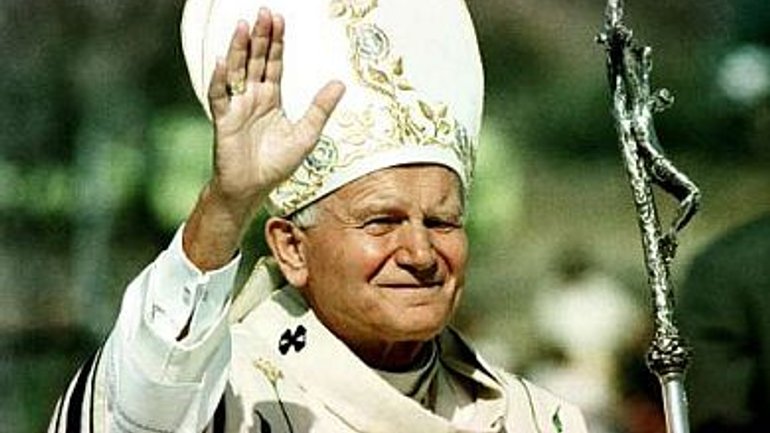
The twentieth century was embodied in Karol Wojtyla – its national awakenings and catastrophes, world wars, discoveries and disappointments, crises, the Beatles, the scientific and technical revolution, mass media, secularization and thrusts of globalization. According to various theorists, the twentieth century was to bring the defeat of religion, destruction of the authority of the church, nullification of faith, its replacement, redefinition of postulates, and the making of faith and even God himself irrelevant.
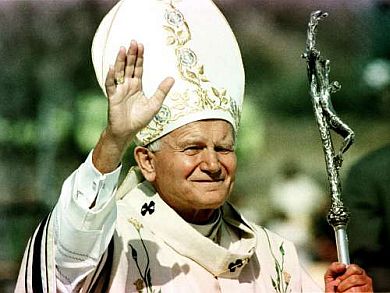 We were waiting for this, right? We knew that it couldn’t be any other way. Because if not him, then who? Many people without shame called him the “Holy Pope” during his life.
We were waiting for this, right? We knew that it couldn’t be any other way. Because if not him, then who? Many people without shame called him the “Holy Pope” during his life.
In reality, of course, the church has someone to glorify even today. In the last few years we have seen surprising examples of Christian courage, feat of profession of faith.
The twentieth century was embodied in Karol Wojtyla – its national awakenings and catastrophes, world wars, discoveries and disappointments, crises, the Beatles, the scientific and technical revolution, mass media, secularization and thrusts of globalization. According to various theorists, the twentieth century was to bring the defeat of religion, destruction of the authority of the church, nullification of faith, its replacement, redefinition of postulates, and the making of faith and even God himself irrelevant.
For some reason in my mind Karol Wojtyla always stands next to Stanislaw Lem – paradoxically, for they are almost antipodes. Because they are both Polish? Because they are almost peers and, accordingly, felt all the misfortunes that Poland experienced in the twentieth century? Because the opposite, it would seem, spiritual and intellectual orientations of both are rooted in the unknown, in what lies beyond the human realm? Two great elders, whose deaths coincided almost with the end of the century and entirely with the end of an era. Having come from one point in time, these two Poles completely outline the spiritual horizon of the twentieth century with its triumph and weakness of mind, with its triumph and weakness of faith.
In Ukraine people waited for the beatification especially impatiently. How else, for Actually, he can be called “our Pope” in the all the corners of the world that he continually visited. But we feel that we have more right to do so: the newly blessed John Paul II is not only someone we saw. He is someone who shared the fate of the century, and therefore each of us is connected to the century. And he is, of course, above all “our” blessed pope, because we are connected to his biography by geography – a fact that shouldn’t be played down, especially when it concerns the twentieth century.
He was the head of the Universal Church, but he remained the “Pope form the East,” the Slavic pope. This meant a lot for eastern Europe (not only for Poland, where for some it meant, it seems, too much). But it meant a lot also for the Vatican. The conclave’s election of a young Pole was probably a shock for the Catholic Church. And he justified the expectations – no one thought that his pontificate was boring. The fact that he was the “Pope from the East” – from the Christian, European, ideological periphery – should have been significant. In any case, his desire to expand the borders, fight limitations – foremost in Christianity – fight evil, which he knew first hand, to bring light to the world, which, despite all advancements in science, technology, and ideologies, was persistently sinking into obscurity. In the absence of snobbery concerning the “provinces,” metropolitanates often astonish, especially the ones burdened by age-old traditions.
Becoming for his church the “light from the East,” for many people around the world he also became the “light from the West.” With his travels, Pope John Paul II helped the Christian world understand that the Vatican is not an “administration center” isolated from the world (including the Christian world), detached from reality, engaged in secret political games, intrigues, trying to change political maps, and filtering financial flows. This “Vatican” was literature, cinema, and media worthy well before Dan Brown. The Vatican under the reign of Pope John Paul II became a place from where the Good News reached all corners of the world. And this is the Vatican’s most important designation, because this news the head of the church himself, the successor of the Apostle Peter, the slave of God’s slaves the Roman Pope, brings to the people.
Surely, few heads of churches would not include missionary activity in their list of priorities. But few heads of churches would “proclaim” this priority so clearly and persistently. To elect a Polish pope was probably the conclaves’ revolutionary decision. But the real revolution was what was embodied in him – Christian cosmopolitanism, truth, clearly revealed universality, in which there is not a Greek or a Jew, not even a Pole or a Ukrainian!
Can it be any other way if you are talking in the name of Christ?
Of course we waited for Karol Wojtyla to be beatified, and very quickly. If not him, then who? This is what we thought. But perhaps the beatification commission was in a difficult situation. Pope John Paul II was a very atypical deputy of Peter’s, even against the background of his vibrant predecessors John XXIII and Paul VI. He was a star in the almost completely pop culture understanding of this word. He packed auditoriums, squares, and stadiums with cheering audiences. He was a vibrant hero in the media. His name was written on fences, like names of rock stars. He traveled the world as if he were on tour to promote his albums and himself.
But something always distinguished him from the celebrities in the tabloids, who, unfortunately, are sometimes transformed from people delivering the Truth of Christ into people carrying some vague “message.” Pope John Paul II was the Columbus of popes, who re-opened the world for the Catholic world, who re-introduced Jesus to the world, who showed the difference between PR and sermons, between “promotion” and the mission. What he did can be called “Gospel PR.” But does it have to lead to marketing sermons of the Way, the Truth, and the Life? Perhaps, it is in this impossibility to lead to such marketing, in the disagreement to play by foreign, even if they may be successful, rules of mass culture – the secret is how to use the media but not allow it use you, not allow it to transform you into a character in a never-ending infotainment, not allow it to transform you into something kitsch.
Karol Wojtyla never did receive the Nobel Peace Prize. But he was proclaimed blessed and, in the future, may be canonized. What does this mean for the world, which, it seems, did not improve during his pontificate nor during the years after his death? Maybe secular observers will evaluate this beatification as a tribute of the Catholic Church to the missionary-pope, who is credited to bringing a huge increase in believers, who consolidated the unity of the Catholic Church, who made its universality real, tangible, indisputable. Maybe they will also note the growth in popularity of the Catholic Church in secular and non-Catholic circles. But again the most important feats will be ignored and the world will again lose a chance to improve. The world improves not because someone makes it better, but because the boundary between good and evil becomes clearer, wider, and to cross it becomes harder. But this depends above all on our own desire to feel this boundary, to hear what is being said about it.
One of the most difficult legacies of the twentieth century is the legacy of the terrible bloody wars, revolutions, terror, changes in socioeconomic models, fear before a clear choice and unwillingness to speak honestly about the past. We were so often deceived, allowed ourselves to be cheated, sincerely believing in “good,” which turned out to be a horrible crime, and now we believe it is better not to use such words, not to evaluate it at all. Who will give us a guarantee that we won’t make a mistake again?
Pope John Paul II was an outsider in the Nobel Peace Prize world because he was not ashamed to evaluate good and evil and never under any pressure to “compromise.” His position was not fundamentalist (even the biggest critics could not reproach him for this). He remained a supporter of positive actions, struggles not “against” certain human and societal defects, but “for” – for every soul, and for Christian nature, for its improvement, for light in it. But instead of hearing this “positive message,” the pope was called to “reform,” “liberalize,” “understand problems deeper,” “to change along with the world, which isn’t staying in one place.” But he again and again asserted a clear line between light and darkness and the guarantee that won’t betray Christ. Maybe that is why he so readily went to the most remote corners of the world, leaving the comfortable, convenient dusky Europe, which is still not ready to overcome its traumas and its fears. These trips made him similar to a hero from a children’s play, who fearlessly advances into the darkness with only one weapon – faith in the power of good.
And he who will compose chants in honor of the newly blessed, I ask you to not make anything up. Let this be a song about rain – a song from Karol Wojtyla’s childhood, which Pope John Paul II sang ten years ago in Lviv in the misty rain. What better than a children’s song will describe a person who lived his life with Christ?





